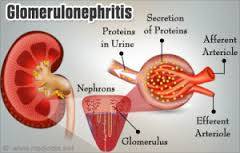NCLEX Glomerulonephritis
NCLEX Glomerulonephritis
Glomerulonephritis is inflammation of the tiny filters in your kidneys (glomeruli). Glomeruli remove excess fluid, electrolytes and waste from your bloodstream and pass them into your urine. Also called glomerular disease, glomerulonephritis can be acute — a sudden attack of inflammation — or chronic — coming on gradually.
Glomerulonephritis (GN), also known as glomerular nephritis, is a term used to refer to several kidney diseases (usually affecting both kidneys). Many of the diseases are characterized by inflammation either of the glomeruli or of the small blood vessels in the kidneys, hence the name, but not all diseases necessarily have an inflammatory component.
As it is not strictly a single disease, its presentation depends on the specific disease entity: it may present with isolated hematuria and/or proteinuria (blood or protein in the urine); or as a nephrotic syndrome, a nephritic syndrome, acute kidney injury, or chronic kidney disease.
They are categorized into several different pathological patterns, which are broadly grouped into non-proliferative or proliferative types. Diagnosing the pattern of GN is important because the outcome and treatment differs in different types. Primary causes are intrinsic to the kidney. Secondary causes are associated with certain infections (bacterial, viral or parasitic pathogens), drugs, systemic disorders (SLE, vasculitis), or diabetes.
Signs and Symptoms
Signs and symptoms of glomerulonephritis depend on whether you have the acute or chronic form, and the cause. Your first indication that something is wrong may come from symptoms or from the results of a routine urinalysis.
Glomerulonephritis signs and symptoms may include:
- Pink or cola-colored urine from red blood cells in your urine (hematuria)
- Foamy urine due to excess protein (proteinuria)
- High blood pressure (hypertension)
- Fluid retention (edema) with swelling evident in your face, hands, feet and abdomen
- Fatigue from anemia or kidney failure
Causes
Infections
- Post-streptococcal glomerulonephritis. Glomerulonephritis may develop a week or two after recovery from a strep throat infection or, rarely, a skin infection (impetigo). To fight the infection, your body produces extra antibodies that may eventually settle in the glomeruli, causing inflammation. Children are more likely to develop post-streptococcal glomerulonephritis than are adults, and they’re also more likely to recover quickly.
- Bacterial endocarditis. Bacteria occasionally can spread through your bloodstream and lodge in your heart, causing an infection of one or more of your heart valves. You’re at greater risk of this condition if you have a heart defect, such as a damaged or artificial heart valve. Bacterial endocarditis is associated with glomerular disease, but the exact connection between the two is unclear.
- Viral infections. Viral infections, such as the human immunodeficiency virus (HIV), hepatitis B and hepatitis C, may trigger glomerulonephritis.
Immune diseases
- Lupus. A chronic inflammatory disease, lupus can affect many parts of your body, including your skin, joints, kidneys, blood cells, heart and lungs.
- Goodpasture’s syndrome. A rare immunological lung disorder that may mimic pneumonia, Goodpasture’s syndrome causes bleeding in your lungs as well as glomerulonephritis.
- IgA nephropathy. Characterized by recurrent episodes of blood in the urine, this primary glomerular disease results from deposits of immunoglobulin A (IgA) in the glomeruli. IgA nephropathy can progress for years with no noticeable symptoms.
Vasculitis
- Polyarteritis. This form of vasculitis affects small and medium blood vessels in many parts of your body, such as your heart, kidneys and intestines.
- Wegener’s granulomatosis. This form of vasculitis affects small and medium blood vessels in your lungs, upper airways and kidneys.
Conditions likely to cause scarring of the glomeruli
- High blood pressure. High blood pressure can damage your kidneys and impair their ability to function normally. Glomerulonephritis can also lead to high blood pressure because it reduces kidney function and may influence how your kidneys handle sodium.
- Diabetic kidney disease. Diabetic kidney disease (diabetic nephropathy) can affect anyone with diabetes. Diabetic nephropathy usually takes years to develop. Good control of blood sugar levels and blood pressure may prevent or slow kidney damage.
- Focal segmental glomerulosclerosis. Characterized by scattered scarring of some of the glomeruli, this condition may result from another disease or occur for no known reason.
Chronic glomerulonephritis sometimes develops after a bout of acute glomerulonephritis. In some people there’s no history of kidney disease, so the first indication of chronic glomerulonephritis is kidney failure. Infrequently, chronic glomerulonephritis runs in families. One inherited form, Alport syndrome, also may involve hearing or vision impairment.
Complications
- Acute kidney failure. Loss of function in the filtering part of the nephron may cause waste products to accumulate rapidly. You may need emergency dialysis — an artificial means of removing extra fluids and waste from your blood — typically by an artificial kidney machine.
- Chronic kidney disease. With chronic kidney disease, your kidneys gradually lose their filtering ability. If your kidney function deteriorates to less than 10 percent of normal capacity, you have end-stage kidney disease, which requires dialysis or a kidney transplant to sustain life.
- High blood pressure. Damage to your kidneys and the resulting buildup of wastes in the bloodstream can raise your blood pressure.
- Nephrotic syndrome. With nephrotic syndrome, you have too much protein in your urine, which results in too little protein in your blood. Nephrotic syndrome may also be associated with high blood cholesterol and swelling (edema) of the eyelids, feet and abdomen.
Treatments
Treatment of glomerulonephritis and your outcome depend on:
- Whether you have an acute or chronic form of the disease
- The underlying cause
- The type and severity of your signs and symptoms
Treat high blood pressure and underlying cause
NCLEX National Exam Courses
Overview
- Elite Reviews Offers A Variety Of Online Courses That Will More Than Adequately Help Prepare The Graduate Nurse To Pass The National Exam.
- Each Course Includes Sample Questions & The Most Current NCLEX Exam Updates.
NCLEX Free Trial
- FREE Sample Lecture & Practice Questions
- Available For 24 Hrs After Registration
- Click The Free Trial Link To Get Started – NCLEX Free Trial
How It Works
How The Course Works
- First – Purchase The Course By Clicking On The Blue Add To Cart Button – You Will Then Be Prompted To Create A User Account.
- Second – After Creating An Account, All 3 Options (90, 120, 150 Days) Will Be Listed. Select The Option You Desire And Delete The Other Two.
- Third – You Will Be Prompted To Pay For This Review Using PayPal – After Payment You Will Be Redirected Back To Your Account.
- Last – Click The Start Button Located Within Your Account To Begin The Course
- 175 Prep Questions
- Q & A With Rationales
- Alt. Format Questions
- 90 Days Availability
- Cost $75.00
- 1250+ Prep Questions
- Q & A With Rationales
- Alt. Format Questions
- 90 Days Availability
- Cost $200.00
NCLEX Practice Questions Bundle
- 1350+ Prep Questions
- Q & A With Rationales
- Alt. Format Questions
- 90 Days Availability
- Cost $225.00
NCLEX Review Course
- Option 1
- Lectures & 1250+ Questions
- Q & A With Rationales
- Alt. Format Questions
- 90 Days Availability
- Cost $275.00
- Option 2
- Lectures & 2000+ Questions
- Q & A With Rationales
- Alt. Format Questions
- 90 Days Availability
- Cost $325.00
NCLEX Review Course Bundle
- Option 3
- Lectures & 3000+ Questions
- Q & A With Rationales
- Alt. Format Questions
- 90 Days Availability
- Cost $375.00







